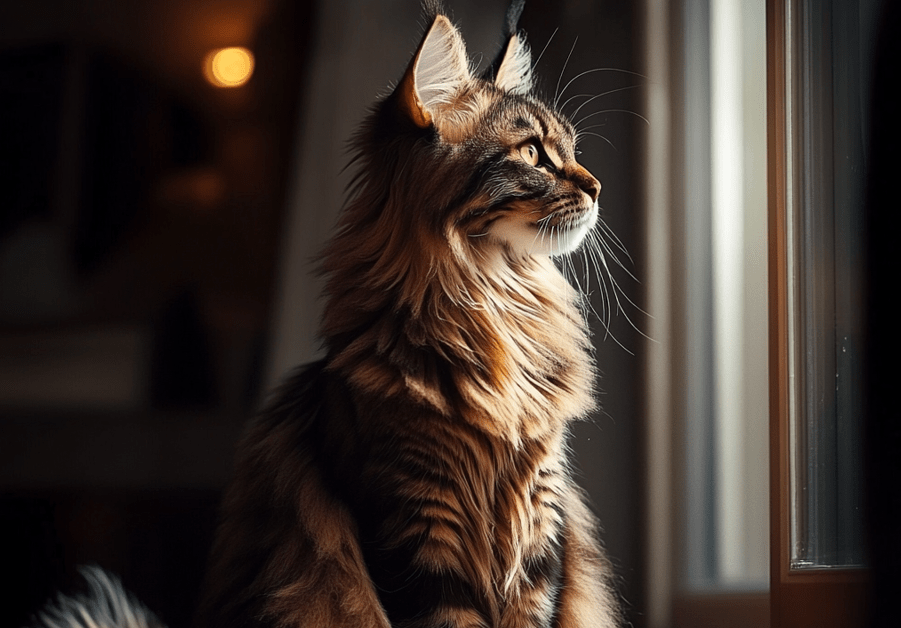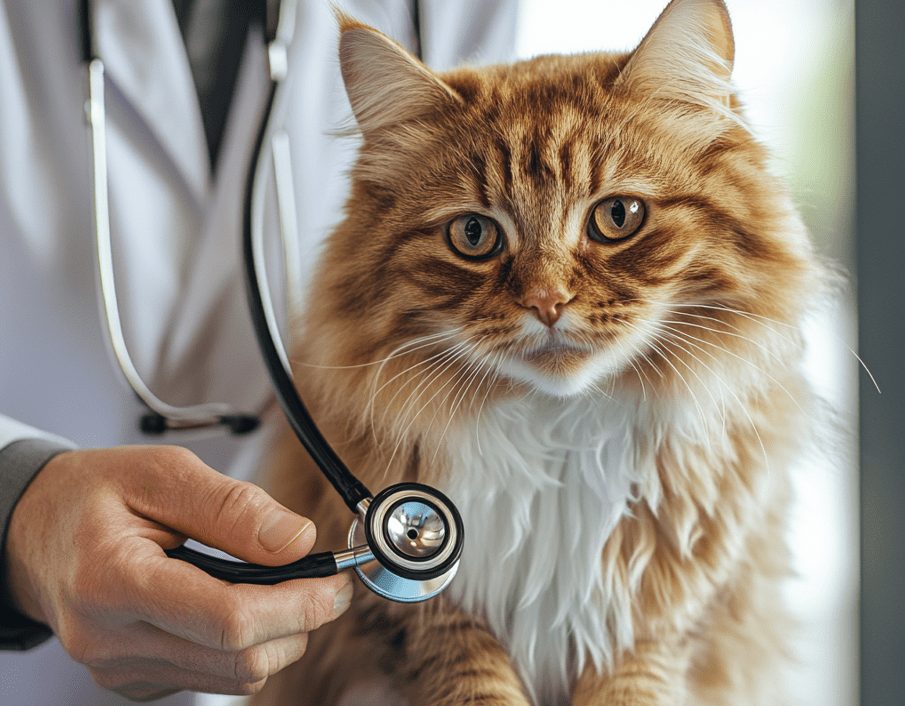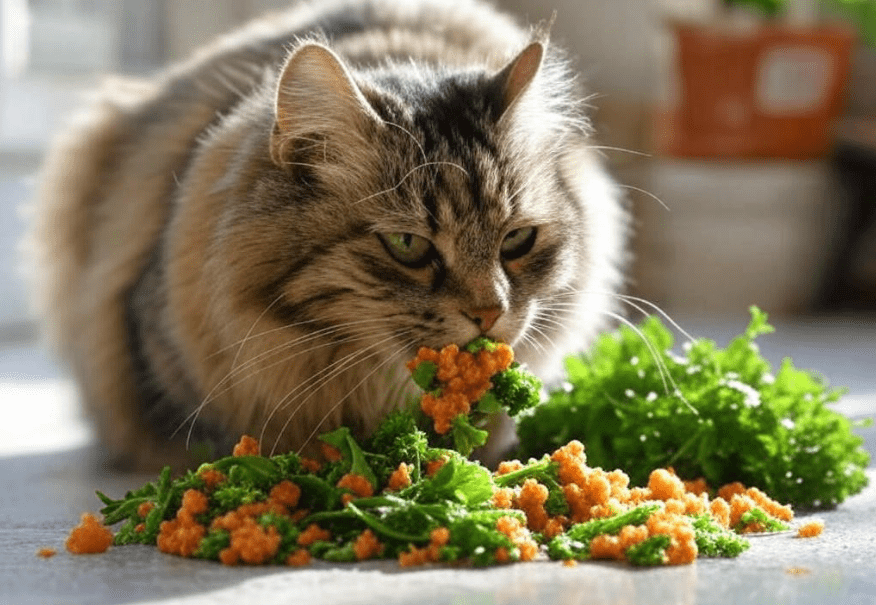
Maine Coon cats, often referred to as “gentle giants,” are cherished for their majestic size, friendly personalities, and luxurious coats. However, these beloved felines are predisposed to certain health conditions, with Maine Coon heart health being a critical concern. One of the most significant threats to their well-being is Hypertrophic Cardiomyopathy (HCM), a common heart disease in the breed. This comprehensive guide explores HCM in Maine Coons, its warning signs, risk factors, diagnosis, management, and prevention strategies. By understanding Maine Coon heart health, you can take proactive steps to ensure your cat lives a long, healthy life.
What is Hypertrophic Cardiomyopathy (HCM)?
Hypertrophic Cardiomyopathy (HCM) is the most prevalent heart disease in cats, particularly affecting Maine Coons due to a genetic predisposition. HCM causes the heart muscle, specifically the left ventricle, to thicken abnormally. This thickening reduces the heart’s ability to pump blood efficiently, potentially leading to serious complications like heart failure, blood clots, or sudden death.
Why Maine Coons Are at Risk
Maine Coons have a genetic mutation in the MYBPC3 gene, which is strongly associated with HCM. Studies estimate that up to 30–40% of Maine Coons may carry this mutation, making Maine Coon heart health a top priority for owners and breeders. While not all cats with the mutation develop clinical HCM, the risk is significantly higher in this breed compared to others.
Understanding the Impact of HCM on Maine Coon Heart Health
HCM can remain asymptomatic for years, making it a silent threat. In some cases, Maine Coons may live normal lives without ever showing symptoms, while others develop severe complications. Understanding how HCM affects Maine Coon heart health is essential for early detection and management.
How HCM Affects the Heart
Thickened Heart Muscle: The thickened left ventricle reduces the heart’s chamber size, limiting blood flow.
Reduced Oxygen Delivery: Inefficient pumping decreases oxygen supply to the body.
Arrhythmias: Abnormal heart rhythms can develop, increasing the risk of sudden death.
Blood Clots: Stagnant blood flow in the heart can form clots, leading to thromboembolism (e.g., saddle thrombus).
Heart Failure: Over time, the heart may struggle to meet the body’s demands, causing fluid buildup in the lungs or abdomen.
Warning Signs of HCM in Maine Coons
Detecting HCM early can significantly improve your Maine Coon’s prognosis. Since symptoms may be subtle or absent in the early stages, owners must be vigilant for any changes in behavior or health. Below are the key warning signs of HCM that could indicate issues with Maine Coon heart health.
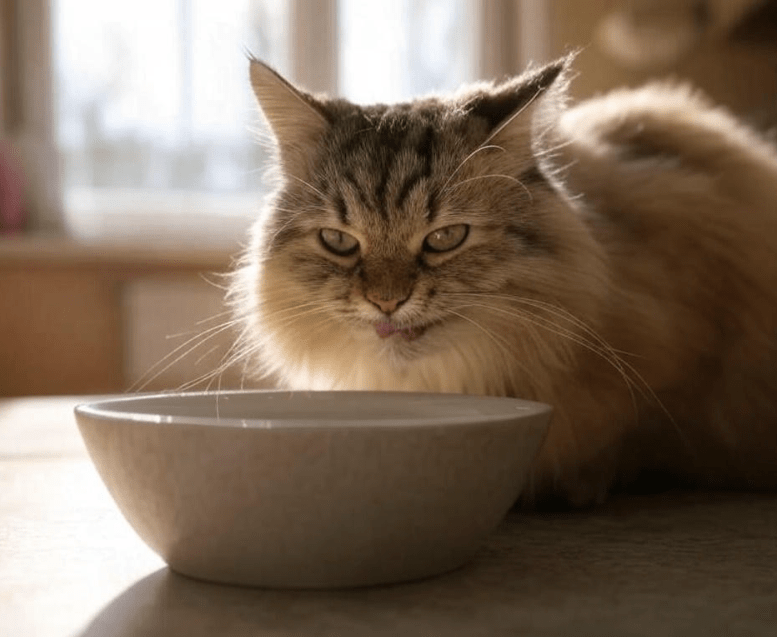
1. Lethargy or Weakness
A Maine Coon with HCM may become less active, tire quickly during play, or seem unusually lethargic. This occurs because the heart struggles to supply oxygen to muscles.
What to Watch For: Reluctance to climb, jump, or engage in usual activities; excessive sleeping.
2. Difficulty Breathing
Labored or rapid breathing is a red flag for heart issues. Fluid buildup in the lungs (pulmonary edema) due to heart failure can make breathing difficult.
What to Watch For: Open-mouth breathing, panting, or wheezing; increased respiratory rate at rest.
3. Sudden Lameness or Paralysis
HCM can lead to blood clots that travel to the hind legs, causing a saddle thrombus. This is a medical emergency.
What to Watch For: Sudden inability to use hind legs, vocalizing in pain, or cold limbs.
4. Fainting or Collapse
Reduced blood flow to the brain can cause fainting spells (syncope), especially during exertion.
What to Watch For: Brief episodes of collapse or disorientation, often after activity.
5. Abnormal Heart Sounds
Veterinarians may detect a heart murmur or irregular heartbeat during routine exams, even before symptoms appear.
What to Watch For: Your vet may note a murmur, gallop rhythm, or arrhythmia during a checkup.
6. Weight Loss or Poor Appetite
HCM can reduce appetite or lead to weight loss due to decreased energy or discomfort.
What to Watch For: Gradual weight loss, picky eating, or refusal of food.
7. Behavioral Changes
Maine Coons with HCM may become withdrawn, irritable, or less social due to discomfort or fatigue.
What to Watch For: Hiding more often, avoiding interaction, or changes in grooming habits.
Risk Factors for HCM in Maine Coons
Several factors increase the likelihood of HCM in Maine Coons, influencing Maine Coon heart health. Understanding these can help you assess your cat’s risk and take preventative measures.

Genetics: The MYBPC3 gene mutation is a primary risk factor. Cats with one or two copies of the mutation are at higher risk.
Family History: Maine Coons from lines with a history of HCM are more likely to develop the condition.
Age: HCM often manifests in young to middle-aged cats (1–5 years), though it can appear later.
Gender: Male Maine Coons are slightly more prone to HCM than females.
Stress: Chronic stress or high-energy environments may exacerbate heart strain in predisposed cats.
Diagnosing HCM in Maine Coons
Early diagnosis is critical for managing HCM and improving Maine Coon heart health. If you notice any warning signs or your cat is at high risk, consult a veterinarian promptly. Diagnostic tools include:
1. Physical Examination
A veterinarian will listen for heart murmurs, gallop rhythms, or irregular heartbeats using a stethoscope.
2. Echocardiogram (Ultrasound)
An echocardiogram is the gold standard for diagnosing HCM. It visualizes the heart’s structure, measuring wall thickness and blood flow.
Why It’s Important: Confirms HCM, assesses severity, and detects complications like clots or fluid buildup.
3. Electrocardiogram (ECG)
An ECG evaluates heart rhythm, identifying arrhythmias associated with HCM.
4. Chest X-Rays
X-rays can reveal heart enlargement or fluid in the lungs, indicating heart failure.
5. Blood Tests
Blood tests check for biomarkers like NT-proBNP, which may be elevated in cats with heart disease.
6. Genetic Testing
Genetic screening for the MYBPC3 mutation can identify Maine Coons at risk, even before symptoms appear.
How It Works: A DNA sample (cheek swab or blood) is analyzed for the mutation.
Who Should Test: Kittens, breeding cats, or Maine Coons with a family history of HCM.
Managing HCM in Maine Coons
While HCM is not curable, early detection and proper management can slow its progression and enhance Maine Coon heart health. Treatment focuses on alleviating symptoms, preventing complications, and improving quality of life.
1. Medications
Veterinarians may prescribe medications to manage HCM symptoms and complications:
Beta-Blockers (e.g., Atenolol): Reduce heart rate and improve blood flow.
ACE Inhibitors (e.g., Enalapril): Lower blood pressure and ease heart workload.
Diuretics (e.g., Furosemide): Remove excess fluid from the lungs or abdomen.
Anticoagulants (e.g., Clopidogrel): Prevent blood clots and reduce thromboembolism risk.
2. Dietary Adjustments
A heart-healthy diet can support Maine Coon heart health by reducing strain on the cardiovascular system.
Low-Sodium Food: Minimizes fluid retention and blood pressure.
Taurine Supplementation: Supports heart muscle function (consult your vet).
Weight Management: Prevents obesity, which exacerbates heart disease.
3. Stress Reduction
Stress can worsen HCM symptoms. Create a calm environment to support your Maine Coon’s heart health.
Tips:
1.Provide quiet, safe spaces for rest.
2.Use pheromone diffusers like Feliway to reduce anxiety.
3.Maintain a consistent routine for feeding and play.
4. Regular Veterinary Monitoring
Frequent checkups are essential for tracking HCM progression and adjusting treatment.
Recommended Schedule:
1.Every 6–12 months for asymptomatic cats with the MYBPC3 mutation.
2.Every 3–6 months for cats with diagnosed HCM.
3.Immediate visits for new symptoms like breathing difficulty or lethargy.
5. Exercise Moderation
While Maine Coons are active, excessive exertion can strain a compromised heart.
Tips:
1.Encourage gentle play with wand toys or low-intensity games.
2.Avoid stressful activities like chasing laser pointers for extended periods.
3.Monitor for signs of fatigue during play.
Preventing HCM in Maine Coons
While HCM cannot always be prevented due to its genetic basis, proactive steps can reduce risks and support Maine Coon heart health.
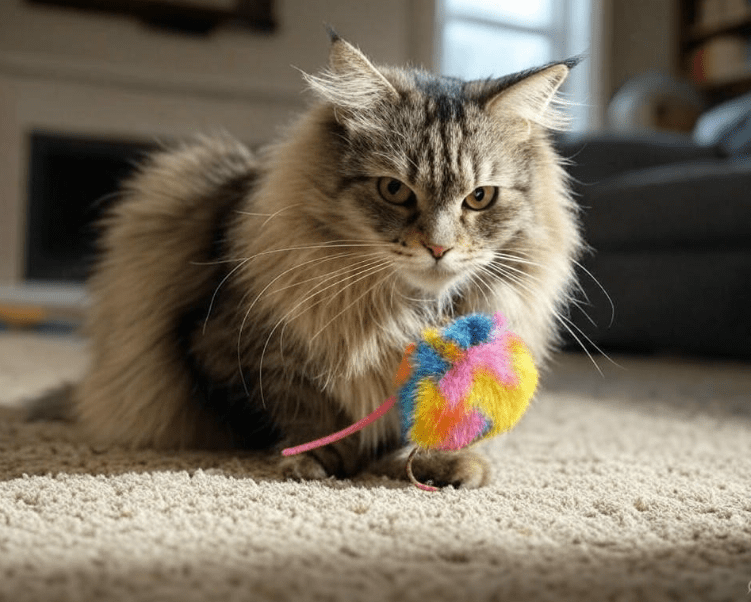
1. Genetic Screening
Test Maine Coons for the MYBPC3 mutation before breeding or as part of routine health checks.
Benefits:
1.Identifies at-risk cats for closer monitoring.
2.Informs breeding decisions to reduce HCM prevalence.
2. Responsible Breeding
Breeders play a critical role in reducing HCM in Maine Coons.
Best Practices:
1.Avoid breeding cats with the MYBPC3 mutation or a history of HCM.
2.Conduct echocardiograms on breeding cats to confirm heart health.
3.Share genetic and health information transparently with buyers.
3. Routine Veterinary Care
Annual vet visits, including heart auscultation, can catch early signs of HCM before symptoms appear.
4. Healthy Lifestyle
A balanced diet, regular exercise, and stress-free environment promote overall cardiovascular health.
Tips:
1.Feed high-quality, taurine-rich cat food.
2.Provide enrichment like cat trees and puzzle toys to keep your Maine Coon active.
3.Minimize household stressors like loud noises or sudden changes.
Common Mistakes to Avoid
When managing Maine Coon heart health, steer clear of these pitfalls:
Ignoring Subtle Symptoms: Lethargy or reduced activity may be dismissed as normal aging but could indicate HCM.
Skipping Vet Visits: Routine checkups are crucial for early detection, especially in high-risk breeds.
Overlooking Genetic Testing: Not testing for the MYBPC3 mutation misses an opportunity for proactive care.
Unsupervised Exercise: Allowing intense activity without monitoring can strain a cat with undiagnosed HCM.
Delaying Treatment: Waiting to address symptoms like breathing difficulty can worsen outcomes.
The Role of Breeders and Owners in Maine Coon Heart Health
Both breeders and owners have a responsibility to prioritize Maine Coon heart health. Breeders should focus on genetic screening and responsible breeding practices to reduce HCM prevalence. Owners must stay vigilant for warning signs, invest in regular veterinary care, and create a heart-healthy environment. Collaboration between breeders, owners, and veterinarians is key to improving outcomes for Maine Coons.
When to Seek Emergency Care
HCM can lead to life-threatening complications requiring immediate attention. Seek emergency veterinary care if your Maine Coon shows:
1.Difficulty breathing or open-mouth panting.
2.Sudden hind leg paralysis or lameness.
3.Fainting or collapse.
4.Severe lethargy or unresponsiveness.
Prompt intervention can be lifesaving in these situations.
Living with a Maine Coon with HCM
A diagnosis of HCM is not a death sentence. Many Maine Coons with HCM live fulfilling lives with proper management. Focus on:
1.Adhering to prescribed treatments and follow-up visits.
2.Monitoring for changes in behavior or symptoms.
3.Providing love and a low-stress environment.
4.Celebrating your Maine Coon’s unique personality, even with health challenges.
Resources for Maine Coon Owners
To stay informed about Maine Coon heart health, explore these resources:
Veterinary Cardiologists: Specialists in feline heart disease can provide advanced diagnostics and treatment.
Maine Coon Breed Clubs: Organizations like the Maine Coon Breeders and Fanciers Association offer health resources.
Genetic Testing Labs: Companies like UC Davis Veterinary Genetics Laboratory provide MYBPC3 testing.
Online Communities: Forums and social media groups for Maine Coon owners share experiences and advice.
Conclusion
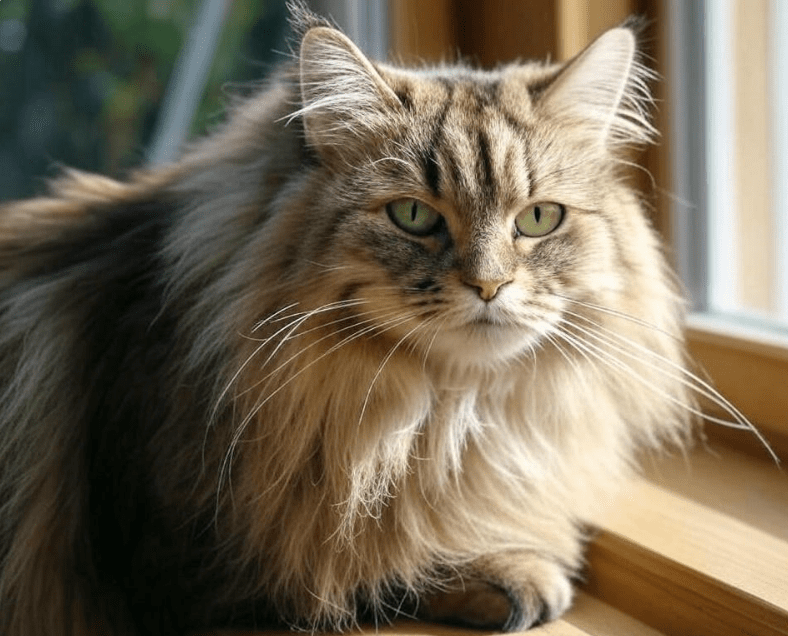
Maine Coon heart health is a critical aspect of caring for this beloved breed, with Hypertrophic Cardiomyopathy (HCM) posing a significant risk. By understanding the warning signs, pursuing early diagnosis, and implementing proactive management, you can safeguard your Maine Coon’s well-being. Genetic screening, responsible breeding, and a heart-healthy lifestyle are essential for preventing and managing HCM. Stay vigilant, work closely with your veterinarian, and provide a loving, stress-free home to ensure your Maine Coon thrives. With the right care, your gentle giant can enjoy a long, happy life despite the challenges of HCM.

